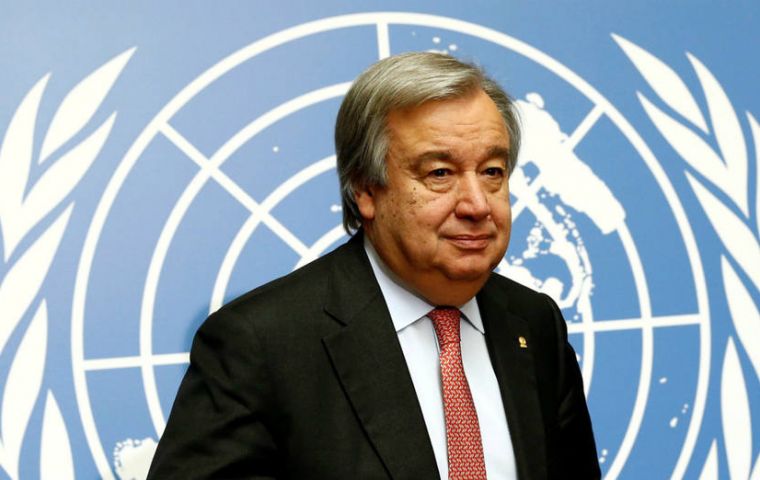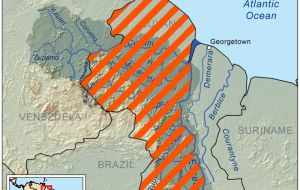MercoPress. South Atlantic News Agency
Guyana/Venezuela border controversy referred to the International Court of Justice
 Secretary-General Guterres stated that he has chosen the International Court of Justice as the means to be used for the solution of the controversy.
Secretary-General Guterres stated that he has chosen the International Court of Justice as the means to be used for the solution of the controversy.  Venezuela is claiming that the 1899 Arbitral Tribunal Award, which had given more than 90% of an area to then British Guiana (now Guyana), is null and void.
Venezuela is claiming that the 1899 Arbitral Tribunal Award, which had given more than 90% of an area to then British Guiana (now Guyana), is null and void. United Nations Secretary-General, António Guterres has referred the Guyana/Venezuela border controversy to the International Court of Justice (ICJ). In a statement which was published on the UN’s website on Tuesday, Stéphane Dujarric, spokesman for the Secretary-General stated that Mr Guterres has fulfilled the responsibility that has fallen to him within the framework set by his predecessor in December 2016, and has chosen the International Court of Justice as the means to be used for the solution of the controversy.
He said that in reaching this decision, the Secretary-General has also reached the conclusion that Guyana and Venezuela could benefit from the continued good offices of the United Nations through a complementary process established on the basis of the powers of the Secretary-General under the Charter of the United Nations.
The Secretary-General, in accordance with the principles of the United Nations, remains committed to accompany both States as they seek to overcome their differences regarding this border controversy.
The decision was anticipated by the Guyana government.
The ICJ will make a final ruling in keeping with the tenets of the 1966 Geneva Agreement. The former UN Secretary-General Ban Ki-moon and Mr. Guterres, in keeping with the 1966 Agreement, agreed to refer the Guyana/Venezuela border controversy to the ICJ if significant progress is not made in arriving at a full agreement for the settlement of the controversy at the level of the Good Offices process.
Venezuela is claiming that the 1899 Arbitral Tribunal Award, which had given more than 90% of an area to then British Guiana (now Guyana), is null and void. Approximately 118 years after that award was issued, the Guyana Government holds strongly to the view that a juridical course of action is the only means through which this matter can be permanently resolved. For more than two years, the government has been seeking to reach a peaceful resolution to the border controversy.
Foreign Affairs Minister Carl Greenidge said recently that the ministry was enhancing its legal standing in the lead-up to the decision . He said the purpose of “enhanced mediation” at the level of the United Nations, Guyana has retained the services of a U.S.-based law firm – Foley Hoag LLP. Foley Hoag was the same law firm that successfully spearheaded the case for the Government of Guyana in the maritime boundary dispute with Suriname.
“The advantage of that is that they know the history and they are familiar with the issues,” Minister Greenidge posited, while noting that through the firm, lawyers have been providing Guyana with advice on “negotiations and pitfalls.”
He had stated that once the matter is referred to the ICJ, the legal team will be expanded. “It is expected that once the process at the ICJ starts we will have to retain additional skills both for the formal presentation and also in terms of the preparation,” the Foreign Affairs Minister explained. The Guyana Government has set aside US$15M for legal fees in this regard.




Top Comments
Disclaimer & comment rules-

-

-

Read all commentsInteresting, as much of Venezuela's claim to Guyana is based on inheritance from Spain.
Jan 31st, 2018 - 10:15 am +4People, don't give Patrick the time of day, he isn't even Argentine. He is an American that was living in Hawaii and is pretending to be Argentine. He recently tried to move to Argentina but was deported having failed to get a work permit. He has numerous convictions for drug use and related crimes and this has clearly addled his mind, that is why he rambles on like a madman
Jan 31st, 2018 - 10:53 pm +3The only reason he is on here is because he was banned from Facebook for making homophobic comments.
How do I know this? He used to be an active member on some Falkland pages until he was banned for being homophobic, this is all public knowledge.
Please ignore him. He's just a bitter Brit hating loner with no country or identity, desperately wanting attention
Pat is actually Italian - at least that's what it says on his passport.
Jan 31st, 2018 - 11:42 pm +1The case will be interesting for the reasons identified by Brit Bod although I suspect it'll offer little illumination with regard to Argentina's fanciful claims as to an inheritance. Claims not recognised outside the Americas.
It should also be noted that the last time that the General Assembly required the Secretary-General to employ his 'good offices' in regard to the Falklands issue was in 1988. He reported in 1989 and that was it.
The matter was settled.
Commenting for this story is now closed.
If you have a Facebook account, become a fan and comment on our Facebook Page!